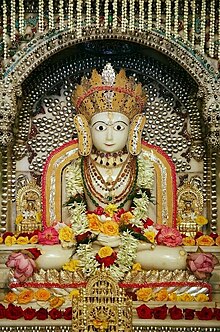Shitalanatha was the tenth tirthankara of the present age according to Jainism. According to Jain beliefs, he became a siddha, a liberated soul which has destroyed all of its karma. Jains believe Shitalanatha was born to King Dradhrath and Queen Nanda at Bhaddilpur into the Ikshvaku dynasty. His birth date was the twelfth day of the Magha Krishna month of the Indian national calendar. Shitalanatha is associated with Svastika (Dig.)/ Srivatasa (Svet.) emblem, Pilurikha tree, Brahma Yaksha and Manavi (Dig.) & Ashoka (Svet.) Yakshi.
| Shitalanatha | |
|---|---|
10th Jain Tirthankara | |
 Shri Shitalanatha bhagwan at Badridas Jain temple, Kolkata | |
| Venerated in | Jainism |
| Predecessor | Pushpadanta |
| Successor | Shreyansanatha |
| Symbol | Kalpavriksha (Wishing Tree) As per Digambar. Srivatsa as per Shwetambar |
| Height | 90 bows (270 meters) |
| Age | 100,000 purva (7.056 Quintillion years) |
| Color | Golden |
| Genealogy | |
| Born | |
| Died | |
| Parents |
|
Biography
editShitalanatha was the tenth tirthankara of the present age according to Jainism.[1] According to Jain beliefs, he became a siddha, a liberated soul which has destroyed all of its karma. Jains believe Shitalanatha was born to King Dradhrath and Queen Nanda at Bhaddilpur into the Ikshvaku dynasty.[1] His birth date was the twelfth day of the Magha Krishna month of the Indian national calendar. Shitalanatha is associated with Svastika (Dig.)/ Srivatasa (Svet.) emblem, Pilurikha tree, Brahma Yaksha and Manavi (Dig.) & Ashoka (Svet.) Yakshi.[2]
Main Temple
editSee also
editNotes
edit- ^ a b Tukol 1980, p. 31.
- ^ Tandon 2002, p. 44.
References
edit- Johnson, Helen M. (1931), Shitalanathacaritra (Book 3.8 of the Trishashti Shalaka Purusha Caritra), Baroda Oriental Institute
- Tandon, Om Prakash (2002) [1968], Jaina Shrines in India (1 ed.), New Delhi: Publications Division, Ministry of Information and Broadcasting, Government of India, ISBN 81-230-1013-3
- Tukol, T. K. (1980). Compendium of Jainism. Dharwad: University of Karnataka.